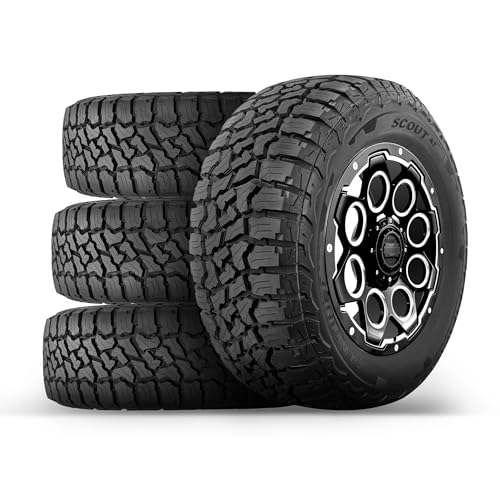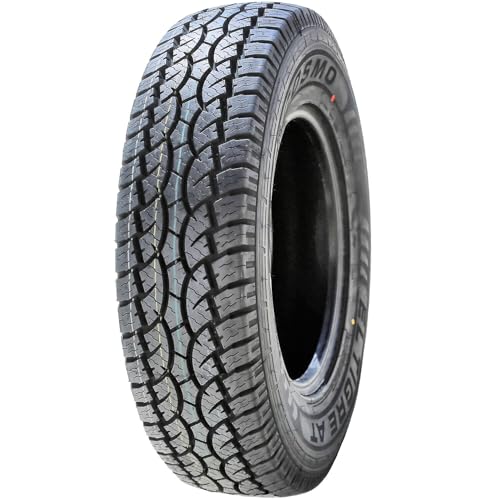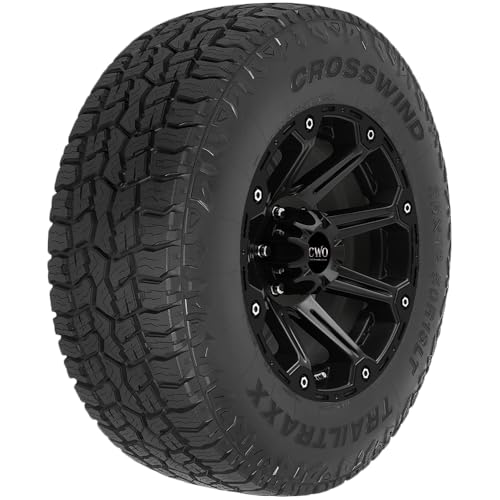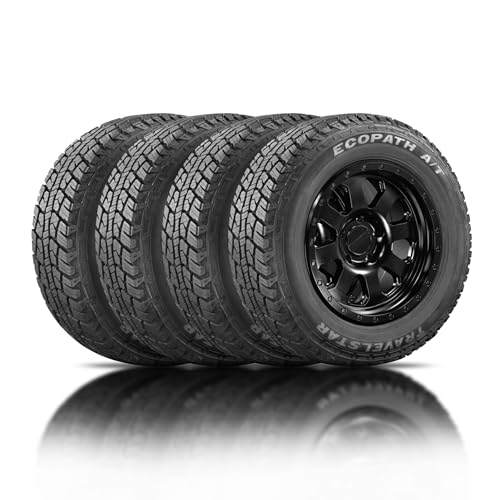10 Best All-terrain Light Truck Tires [2025]
This post contains affiliate links. As an Amazon Associate, we earn from qualifying purchases.
Finding the best all-terrain light truck tires can be a daunting task, given the multitude of options available and the specific needs of your vehicle and driving conditions. To simplify your search, we have meticulously shortlisted 10 top-performing products based on expert reviews, user feedback, and performance metrics. Our curated list not only highlights the best choices on the market but also saves you time and hassle, allowing you to make an informed decision with ease.
Top 10 All-terrain Light Truck Tires In The Market
All-terrain Light Truck Tires Review
- Treadlife: 50,000 miles
- Tires Only
- Season: All Season, Performance: Extreme Terrain
- Car Type: Light Truck
- Load Range F, 12-Ply Rated, 12-PR
- Treadlife: 50,000 miles
- Tire Only
- Season: All Season, Performance: Extreme Terrain
- Car Type: Light Truck
- Load Range E, 10-Ply Rated, 10-PR
- Designed for use on light trucks
- Lateral blocks with stepped-edge and bold sidewall elements offer extra grip
- Wide flat contact patch and stable block design ensure constant contact for smooth driving and handling
- Lateral and zig-zag grooves channel water from footprint for better wet traction
- Sidewall biting edges provide enhanced traction on any terrain
- Size: LT245/75R16, Tire Only - Wheel/Rim Not Included. We offer a complimentary Road Hazard Warranty and Tread Wear Out Warranty for each of our tires in the event of a tire failure after installation and use, including bulges, air leaks, and blowouts.
- True All-Terrain Capability: An all-terrain tire specifically engineered for light trucks and SUVs, ensuring comfortable on-road driving experience and providing confident off-road traction in M+S road conditions.
- Variable Pitch Tread Design:Engineered with aggressive, multi-angle tread blocks that increase surface contact for enhanced traction on/off road and provide superior grip for safer cornering and braking.
- Superior Water Evacuation System:High-capacity drainage channels reduce hydroplaning risk at highway speeds. All-weather certified for reliable performance in rain or light snow.
- Advanced Stone Drilling Protection:Experience enhanced stone drilling protection with an advanced stepped-down tread block design.
- Treadlife: 55,000 miles
- Tire Only
- Season: All Season, Performance: All Terrain
- Car Type: Light Truck
- Load Range E, 10-Ply Rated, 10-PR
- Backed by a 50,000 mile limited manufacturer warranty
- Three Peak Mountain Snowflake rating thanks to improves snow traction over a standard all season rated tire
- Sidewall cleats provide additional grip in deep soil and on loose surfaces
- Interlocked center ribs provides dependable on road handling and stability
- Wide shoulder channels improve performance on wet roads by removing water from the tire
- Treadlife: 60,000 miles
- Tire Only
- Season: All Season, Performance: All Terrain
- Car Type: Light Truck
- Load Range E, 10-Ply Rated, 10-PR
- Treadlife: 55,000 miles
- Tire Only
- Season: All Season, Performance: All Terrain
- Car Type: Light Truck
- Load Range E, 10-Ply Rated, 10-PR
- Designed for use on Jeeps, light trucks, and SUVs
- Backed by a 55,000 mile limited manufacturer tread life warranty
- Three Peak Mountain Snowflake certified for use in moderate to severe winter weather conditions
- Engineered with extra sipes that boost grip in wet and snowy weather
- Ideal for use on vehicles like the Ford F-150, Chevy Silverado, Dodge Durango, Jeep Wrangler, Ford Expedition, Chevy Tahoe, and more.
- 50,000 Mile Limited Tread Wear Out Warranty and Road Hazard Warranty.
- Size: LT265 75R 16, Tire Only - Wheel/Rim Not Included.
- Dimension (inch): 31.65 X 10.51 X 31.65, weight (lbs): 46.05
- Max Pressure (psi): 80; Load IndeX: 123/120 ( 3415 lbs for single tire, 3085 lbs for dual).
- Speed Rating: S (112 mph); Load Range: E (10 PLY).
Our Review Process
To ensure you get reliable product recommendations, we follow a detailed review methodology that includes:
- Market Research: Scanning best-selling and trending products in this category.
- User Feedback: Reviewing customer reviews, star ratings, and complaints.
- Hands-On Testing: Trying select products ourselves when feasible.
- Feature Comparison: Evaluating specs, durability, pricing, and safety.
- Expert Opinions: Consulting with niche experts or credible reviewers.
We independently select the top 10 options based on value, quality, and usability. To learn more, visit our detailed review process.
Key Considerations Before Buying All-Terrain Light Truck Tires
1. Tire Size
The first step in selecting all-terrain light truck tires is to ensure you choose the correct size. Refer to your vehicle’s owner manual or the tire placard located on the driver’s side door jamb for the recommended tire dimensions. The size affects the vehicle’s handling, fuel efficiency, and overall performance.
2. Tread Design
All-terrain tires come with various tread patterns intended for different driving conditions. Look for features like large, aggressive lugs for off-road grip and tighter patterns for on-road stability. Consider where you’ll primarily be driving—on rugged trails, muddy fields, or paved roads—and select a tread design that suits those conditions.
3. Load Capacity
Each tire has a specified load index that indicates how much weight it can safely carry. Make sure that the tires you choose can handle the weight of your truck, as well as any additional cargo you might transport. This is especially important for heavy-duty applications or when towing.
4. Durability and Construction
Look for tires constructed with tougher materials that can withstand punctures and abrasions. Features like reinforced sidewalls can offer additional protection against off-road hazards. Review the tire’s warranty and construction specifications to gauge its durability over time.
5. Weather Conditions
Consider the climate in which you’ll be driving. All-terrain tires are often rated for all seasons, but some models perform better in specific weather conditions. If you live in an area with severe winters or heavy rainfall, you may need tires that are specifically designed to handle those elements.
6. Noise and Comfort
All-terrain tires can be noisier than standard highway tires, particularly at higher speeds. Test drive options if possible, and read reviews to find tires that balance off-road capability with on-road comfort and quietness. A good compromise is essential for daily driving.
7. Brand Reputation and Reviews
Research tire brands and read customer reviews to understand the experiences of other drivers. Well-established brands often provide better customer support and product guarantees. Look for feedback regarding performance, wear, and overall satisfaction from users with similar driving needs.
8. Price and Budget
Establish a budget before you start shopping, but remember that the cheapest option may not always be the best for your needs. Balance performance, durability, and price to find a set of tires that offers good value for your money. Sometimes investing a little more can pay off in terms of longevity and performance.
9. Installation and Maintenance
Factor in the costs and logistics of tire installation and maintenance. Some retailers offer free installation with the purchase of tires, while others may charge. Additionally, consider how easy it will be to rotate and align the tires to ensure even wear over time.
10. Compatibility with Vehicle Modifications
If you have modified your truck (e.g., lifting it or changing suspension), ensure the tires will fit without causing rubbing or clearance issues. It’s important to know how modifications can affect tire selection and overall vehicle performance.
FAQs
What are all-terrain light truck tires?
All-terrain light truck tires are specially designed tires that provide a balance of on-road comfort and off-road capability. They feature a tread pattern that allows for good traction on various surfaces, including mud, gravel, sand, and pavement, making them suitable for trucks and SUVs used in diverse driving conditions.
What are the benefits of using all-terrain light truck tires?
The benefits of all-terrain light truck tires include improved traction on a variety of surfaces, enhanced durability for off-road conditions, and a comfortable ride on highways. They are versatile tires that cater to drivers who require performance in both urban and rural settings.
How do all-terrain tires differ from mud-terrain and highway tires?
All-terrain tires are designed to provide a compromise between on-road comfort and off-road capability, making them ideal for mixed driving conditions. Mud-terrain tires, on the other hand, prioritize off-road performance with deeper treads and larger voids for better grip in mud, while highway tires are optimized for smooth pavement and fuel efficiency, typically lacking the aggressive tread patterns found in all-terrain and mud-terrain tires.
Can all-terrain tires be used in winter conditions?
Many all-terrain tires are designed to perform adequately in light winter conditions, offering decent traction on snow and ice. However, for severe winter weather, dedicated winter tires are recommended, as they provide superior grip and handling in extreme cold and snowy conditions.
How do I choose the right all-terrain light truck tire for my vehicle?
To choose the right all-terrain tire, consider factors such as your driving habits, vehicle type, and typical terrain. Look for tires that match your vehicle’s specifications and load capacity. Additionally, assess tread depth, rubber composition, and manufacturer reviews to ensure you select a tire that meets your performance needs.
Are all-terrain tires noisy on the highway?
All-terrain tires can produce some road noise, especially compared to highway tires. However, advancements in tire technology have led to the development of all-terrain tires that are quieter and provide a more comfortable ride on paved roads. It’s essential to read reviews and listen to user feedback regarding noise levels.
What is the lifespan of all-terrain light truck tires?
The lifespan of all-terrain light truck tires can vary depending on factors such as driving habits, maintenance, and the specific tire brand and model. On average, they can last between 40,000 to 70,000 miles. Regular rotation, alignment checks, and proper air pressure can help extend their lifespan.
Can I use all-terrain tires for towing?
Yes, all-terrain tires can be used for towing, provided they are rated for the weight you intend to tow. Ensure that the tires you choose have the appropriate load rating and are compatible with your vehicle’s towing capacity for optimal safety and performance.
How do I maintain my all-terrain light truck tires?
To maintain all-terrain tires, regularly check air pressure, rotate them every 5,000 to 7,500 miles, and inspect for signs of wear or damage. Additionally, keep an eye on tread depth and perform alignments as needed to ensure even wear and prolong tire life.
Are all-terrain tires more expensive than regular tires?
All-terrain tires can be more expensive than standard highway tires due to their specialized design and materials that enhance durability and performance. However, prices can vary widely based on brand, features, and specifications, so it’s important to shop around for options that fit your budget and needs.
The Bottom Line
In conclusion, selecting the right all-terrain light truck tires can significantly enhance your driving experience, whether you’re tackling rugged off-road conditions or cruising on the highway. Our carefully curated list of the top 10 products reflects extensive research, expert reviews, and real user feedback. Each tire was evaluated based on key factors such as tread design, durability, traction, and noise levels, ensuring that we present options that cater to a range of driving needs and preferences. By considering these crucial aspects, we’ve aimed to guide you toward making an informed decision that aligns with your specific requirements.
By following our list, you can confidently choose a tire that will not only improve your vehicle’s performance but also provide you with safety and reliability on various terrains. Whether you are an adventurous off-roader or someone who needs versatile tires for daily commutes, our selection offers reliable options that will meet your demands. Investing in the right all-terrain tires will ultimately lead to enhanced comfort, performance, and longevity, making your driving experience both enjoyable and worry-free.










